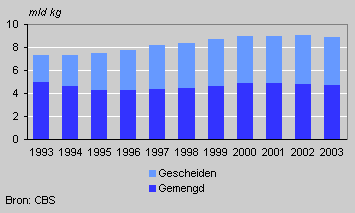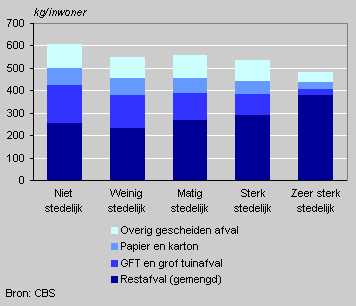Less household waste

The volume of household waste fell from 9.0 billion kilograms in 2002 to 8.9 kilograms in 2003. The volume per capita dropped from 562 kilograms in 2002 to 551 kilograms in 2003. Total volume of household waste fell for the first time in two decades.
Separately collected organic waste
The largest category of separately collected waste is waste from fruit, vegetables and small garden waste. In 2003 almost 1.4 billion kilograms of organic waste were collected separately, 2.5 percent down on the previous year. The volume of organic waste has decreased since 1997.
In 2003 the total volume of separately collected paper waste amounted to 0.9 billion kilograms. The volume of paper waste collected has fallen slightly since 1999, whereas more glass, furniture, household appliances, television sets, refrigerators, etc. and construction waste was collected separately.
Household waste collected by category

More organic waste per capita in rural areas
Separate collection of fruit, vegetables and small garden waste and bulky garden waste is more frequent in villages than in towns. The higher the urbanisation rate the lower the volume of separated organic waste per inhabitant. In the most rural areas the volume of collected organic waste is 122 kilograms per inhabitant as opposed to the large cities with only 22 kilograms.
Separately collected bulky garden waste follows the same pattern; in rural areas 43 kilograms per inhabitant, in the four largest cities only 4 kilograms. In rural areas gardens are more common and usually larger than in built-up areas.
Household waste by urbanisation rate, 2003

Different pattern per type of municipality
More kitchen and garden waste is collected separately among people living in smaller communities and rural areas. Other waste is also collected separately. In villages 76 kilograms of waste paper is collected annually per inhabitant, in the largest cities only 32 kilograms. This also applies to other flows of waste such as construction waste, glass, clothes and wood waste.
Because the system of waste separation is more advanced in rural areas, the volume of mixed household waste collected per inhabitant is smaller than in large cities.
Cees van Beusekom